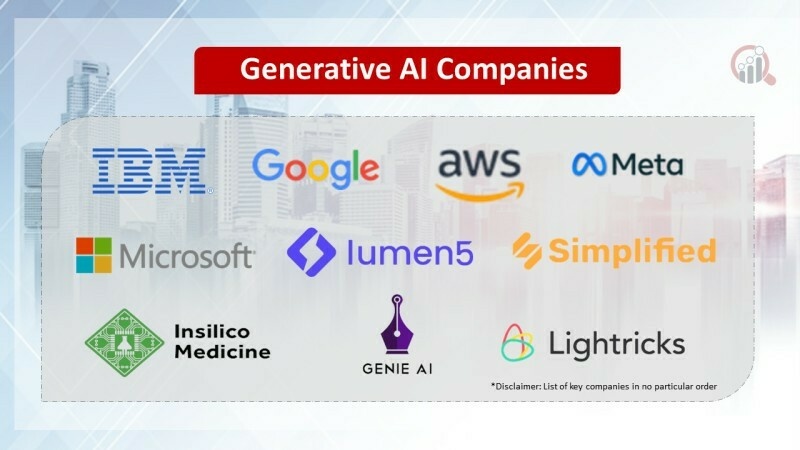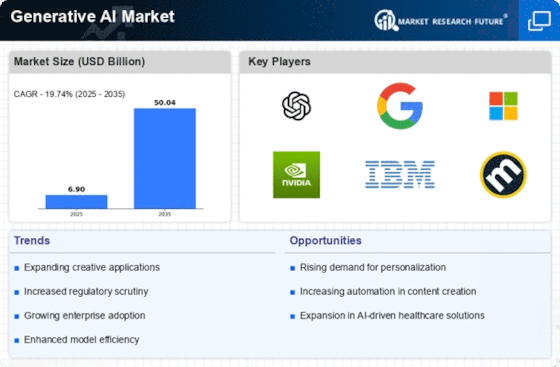Top Industry Leaders in the Generative AI Market

Competitive Landscape of the Generative AI Market
The generative AI market, encompassing technologies like large language models (LLMs) and generative adversarial networks (GANs), is experiencing explosive growth driven by its ability to create novel content, automate tasks, and personalize user experiences. This dynamic landscape is characterized by fierce competition among established tech giants, innovative startups, and research institutions, all vying for market share and dominance.
Key Players:
- Microsoft (US)
- IBM (US)
- Google (US)
- AWS (US)
- META (US)
- Adobe (US)
- OpenAI (US)
- Simplified (US)
- Insilico Medicine (Hong Kong)
- Genie AI (UK)
- Lightricks (Israel)
- Lumen5 (Canada)
- GIPHY (US)
- Dialpad (US)
- Persado (US)
- Codacy (Portugal)
- AI (US)
- Riffusion (US)
- ht (India)
- Speechify (US)
- io (France)
- Midjourney (US)
- FireFlies (US)
- io (Netherlands)
- Morphis Technologies (Portugal)
- Synthesia (UK)
- Mostly Al (Austria)
- Veesual (France)
- Deep AI (US)
- Galileo (US)
- Excel Formula Bot (Florida)
- JetBrains (Czech Republic)
- AI (US)
- GFP-GAN (US)
- Fontjoy (Italy)
- Eleuther AI (US)
- Starry AI (US)
- Magic Studio (US)
Strategies Adopted:
- Foundation Models: Leading players like Google and OpenAI invest heavily in developing large, open-ended language models like Bard and GPT-3, which can be fine-tuned for various downstream applications.
- Specialized Applications: Startups and established players alike are focusing on building targeted solutions for specific industries, such as healthcare (drug discovery), finance (personalized financial planning), and creative industries (content marketing).
- Partnerships and Acquisitions: Collaborations and acquisitions are common, allowing players to leverage complementary expertise and expand their reach. For example, Microsoft's acquisition of Nuance Communications strengthens their healthcare AI offerings.
- Open-Source Initiatives: OpenAI and other research institutions promote open-source development, fostering collaboration and encouraging broader adoption of generative AI technology.
Factors for Market Share Analysis:
- Technical Superiority: The ability to generate high-quality, diverse, and original content is paramount. Factors like model size, training data, and architectural innovations play a crucial role.
- Ease of Use: User-friendly interfaces and readily deployable applications are crucial for wider adoption, especially among non-technical users.
- Industry Focus: Specialization in specific domains like healthcare or finance can provide a competitive edge by catering to unique needs and regulatory requirements.
- Pricing Strategy: Flexible pricing models that cater to different user segments and budget constraints are essential for market penetration.
- Ethical Considerations: Transparency, data privacy, and responsible AI development are becoming increasingly important differentiators, especially in light of bias and misuse concerns.
New and Emerging Companies:
- RunwayML: Develops tools for generating realistic synthetic data, useful for training other AI models and mitigating data privacy concerns.
- Rytr: Offers a user-friendly platform for generating various marketing and creative content formats.
- Synthesia: Creates AI-powered videos with virtual humans, enabling personalized video marketing and training materials.
- Playground AI: Focuses on generative music and sound design, offering tools for musicians and content creators.
Current Investment Trends:
- Venture Capital: Generative AI startups are attracting significant VC investments, with companies like Jasper and RunwayML securing multi-million dollar funding rounds.
- Corporate Ventures: Tech giants are actively investing in generative AI startups and establishing their own venture arms to acquire cutting-edge technology.
- Government Initiatives: Governments are allocating funds for AI research and development, including generative AI, recognizing its potential for economic growth and innovation.
Latest Company Updates:
2023 sees the release of RingCentral's Events platform and the general availability of RingCX; Uniphore incorporates generative AI capabilities; Crestron, Q-SYS, Lenovo, and Jabra all introduce new A/V collaboration solutions; Wrike upgrades its Work Intelligence platform; and Superhuman, which comes with Auto Summarise, launches for Microsoft Teams. Three additional ServiceNow products now include generative AI, and Cognigy has introduced AI Copilot for agents.
Global content and technology giant Thomson Reuters today unveiled a number of GenAI projects aimed at revolutionising the legal industry in 2023. The most notable of these efforts is the introduction of GenAI into AI-Assisted Research on Westlaw Precision, the most cutting edge legal research platform. This skill, which is now available to consumers in the US, enables legal practitioners to find complex research queries fast.
Beta feature










